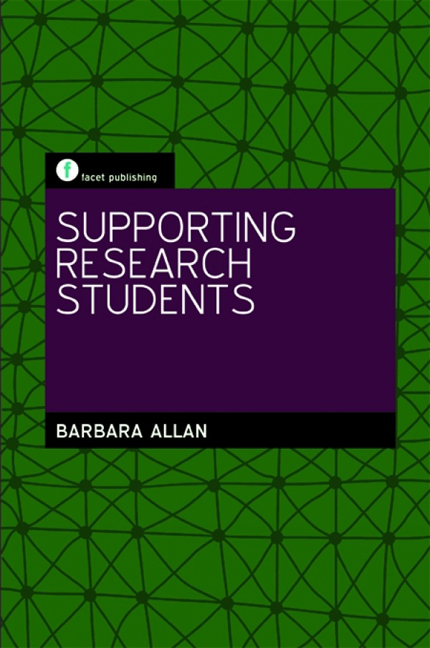Book contents
- Frontmatter
- Contents
- List of figures
- List of tables
- Acknowledgements
- 1 Introduction
- 2 Research and the research process
- 3 The research student's experience
- 4 Moving forward and completing the research
- 5 Research skills training
- 6 Supporting research students in academic libraries and information services
- 7 Virtual graduate schools
- 8 Introduction to research communities
- 9 Professional development
- Conclusion
- References and bibliography
- Index
3 - The research student's experience
Published online by Cambridge University Press: 09 June 2018
- Frontmatter
- Contents
- List of figures
- List of tables
- Acknowledgements
- 1 Introduction
- 2 Research and the research process
- 3 The research student's experience
- 4 Moving forward and completing the research
- 5 Research skills training
- 6 Supporting research students in academic libraries and information services
- 7 Virtual graduate schools
- 8 Introduction to research communities
- 9 Professional development
- Conclusion
- References and bibliography
- Index
Summary
Introduction
In this chapter I consider the role of the supervisor in the life of a doctoral student, and the early stages of the research journey. I cover the research process from getting started through to designing the process, including the topics of induction, working with a supervisor and getting started. Chapter 4 continues the research journey and explores the following stages: the literature review, methodology, fieldwork, writing up, the viva voce examination, amendments and completing the doctorate.
In this chapter I include examples from my own doctoral research experience and from colleagues who have been willing to share their experiences with me.
Starting points
The starting point for potential research students is a desire to continue their studies, e.g. to progress from a taught Master's degree to a research degree, or to return to academic life and complete a doctorate on either a full- or part-time basis, perhaps after a number of years in the workplace. As with students who want to join a taught degree programme, potential research students start their search for a suitable university and department on the basis of their field of interest, the reputations of individual researchers, departments and universities, the availability of funding (some universities provide bursaries and sponsored research studentships) and their desire to study in a particular city or country. There are many sources of information to provide them with advice, including websites such as those provided by the Research Councils (see Chapter 1) and sites such as:
www.findaphd.com/students/life.asp
www.vitae.ac.uk/
www.professionaldoctorates.com/
Useful textbooks on the subject, include: Gina Wisker's The Postgraduate Student Handbook (Palgrave Study Guide, 2001), and Estelle M. Phillips and Derek S. Pugh's How to Get a PhD (Open University Press, 3rd edition, 2000).
Once a student has identified an appropriate university, department and supervisor, he will be required to make a formal application to the university to become a research student. The application process varies from university to university, e.g. in some it is managed centrally by a graduate school or equivalent administrative unit, while in others research student applications are dealt with at faculty or department level. If the student is applying to undertake a PhD, it is likely that he will be required to write a research proposal as part of the application process.
- Type
- Chapter
- Information
- Supporting Research Students , pp. 41 - 56Publisher: FacetPrint publication year: 2009



